#best apps for neurodivergent individuals
Text
48 Apps for Autistics and ADHDers
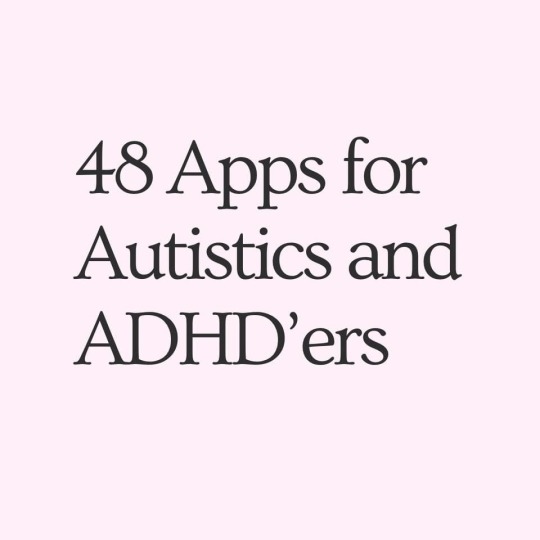
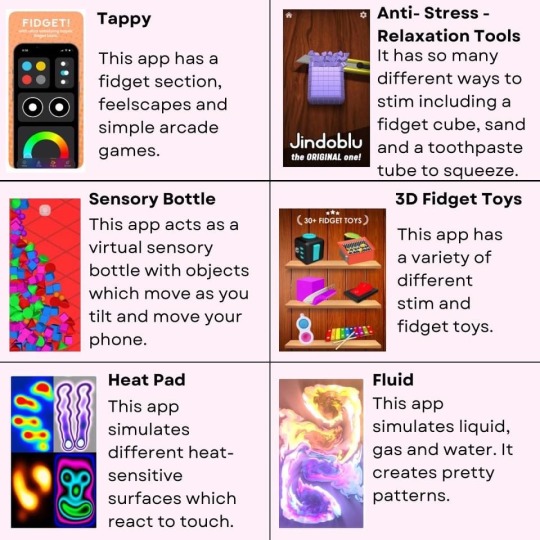
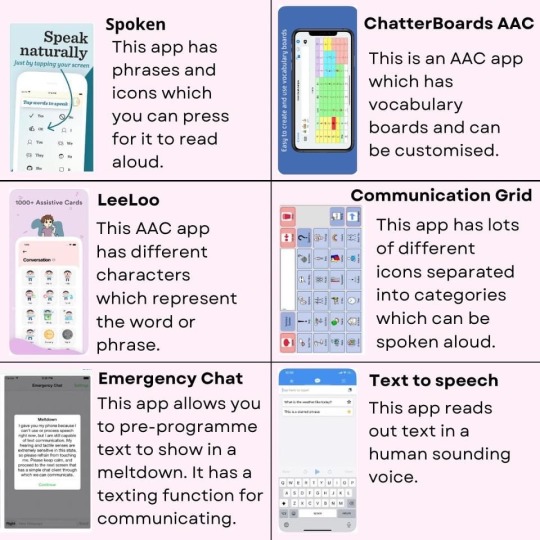
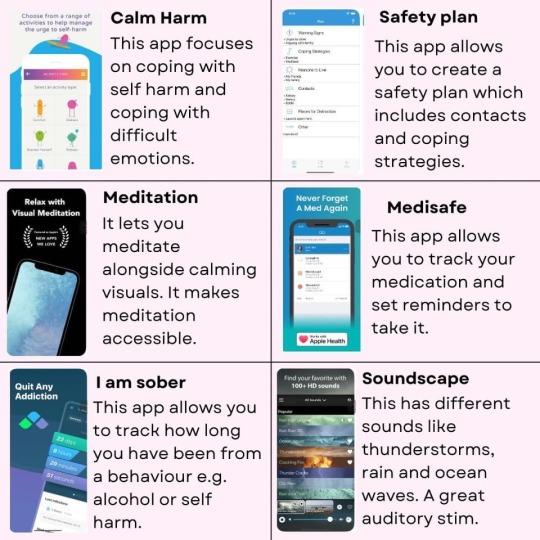

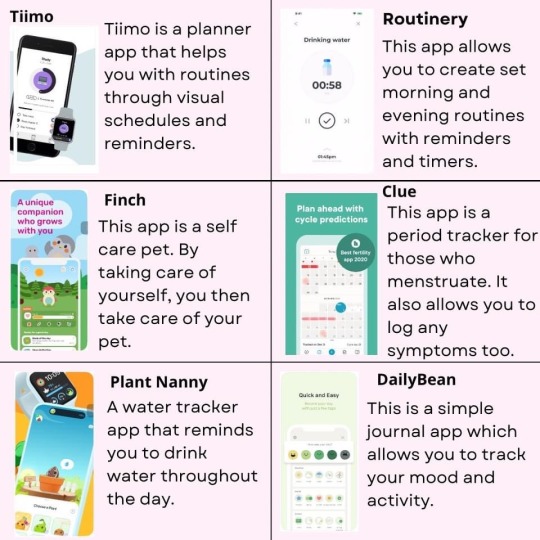
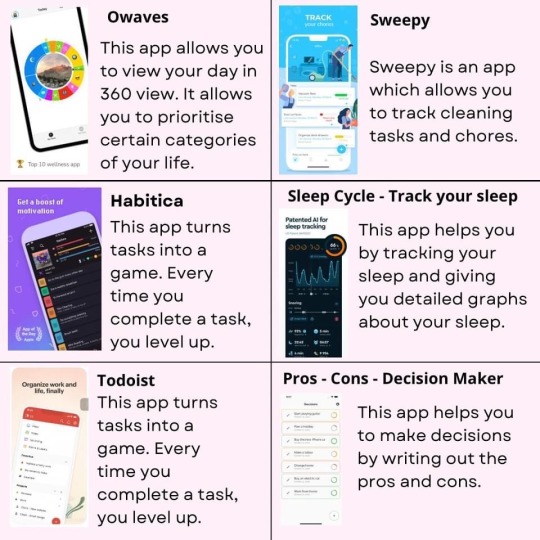
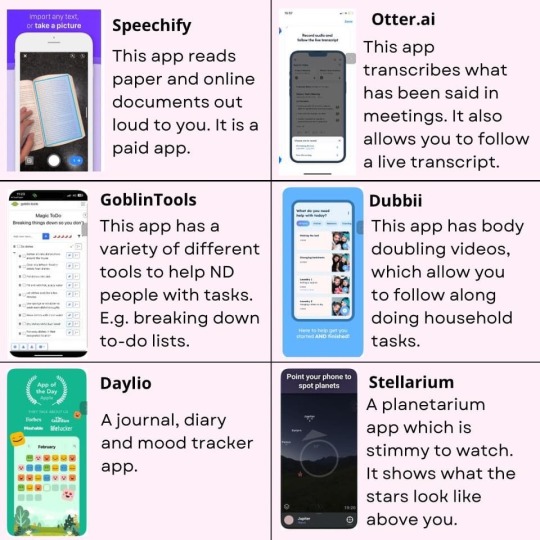
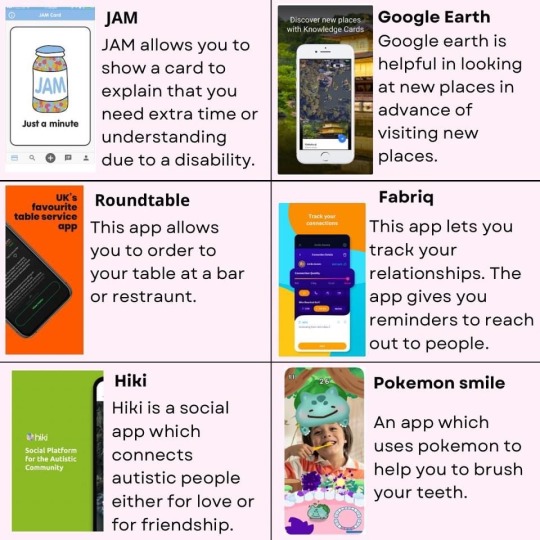
Neurodivergent_lou
#autism#adhd#best apps for neurodivergent individuals#some of these look very helpful#neurodivergent#neurodivergence#actually neurodivergent#feel free to share and reblog#Neurodivergent_lou (Facebook)
7K notes
·
View notes
Text
I remember in a stay in a psychosomatic clinic almost two year ago I became non-verbal for 2 weeks straight. And one time I had an appointment which required much communciation. Good thing, they offered I can use my PC. Scripted a short visual basic script to turn my written words into spoken language, because I find many programs for that unintuitive or too complicated, and I can't really adjust it to my partially minimalist needs.. (also, programming is sooo helpful, it helps me to create my own very individualized accomodations) The person doing the appointment was kind, and he didn't think it would go so fast, he told me afterwards. It was faster than when I usually have to speak. It was such a big relief.
And for the programming part: In regards of my very bad working memory and being prone to soo many awful errors due to high uncertainty in my porbability-based thinking, I start to create my own programs/apps to help myself. As for my theoretical/science/math work, I try to write an algorithm helping me create itself, the algorithm turning into my helpful thinking aid.... So yes, that's how my transhumanist vision becomes reality haha...
We start tiny and slow. But it works.
Furthermore, with all that I can also start to help other people maybe in the future. Neurodivergent people have to suffer far too much. And a large amount of that unnecessary suffering can be reduced by getting proper accomodations. But this even lacks due to autism being so badly understood, even by professionals. This is no blaming, but 'autism research' should NOT be about 'curing' autistic people(which is ableist bullshit! There is nothing to cure, other than ignorance and stigma of society), NO, it should be about understanding these phenomena well enough to offer and create the best accomodations and make life quality better for each individual and their very unique needs! THIS should be the point in autism research! To ensure the best accomodations to make life more life-worthy, to help us being integrated as FULL human being, and treated with respect and tolerance, with dignity. Not ableist middle ages-like propaganda which a lot of it seems to be...
Neurodivergent struggles require neurodivergent solutions.
#programming#ai#giving off transhumanist vibes#creating my own disability aids#neurodivergent struggles#tw ableism#ableism#autism research#asd#autism#cognitive science#cog sci#non-linear cognition#cognition#accomodations#supporting neurodivergent#neurodivergent support#actually autistic
100 notes
·
View notes
Text
Hey folks, I know it’s rare for me to shill for a comic, because cynicism is easier, but on the marvel comics app the Darkhawk mini series is currently on sale.
As an explanation, it’s a superhero comic about a young athlete (Connor/Darkhawk) who in the first issue of the story is diagnosed with multiple sclerosis. It came out at the tail end of last year, and it’s good.
Now that comiXology is basically dead, the Marvel comics app is maybe the best option for reading digital comics, at least Marvel ones. It’s a lot more accessible than kindle, for instance you can still zoom in and go by individual panel. Regarding the sale, each issue is currently only $1.99 each, and the first issue is typically $4.99 by itself, since it’s a bit longer than most single issues. From like $21 to roughly $10.
As for content in this mini series, there are no thought bubbles, Connor and the rest of the cast’s thoughts are shown through the art, using heavy shadows in the background to show dread and grief. It’s incredibly beautiful. His MS seems well researched, and you can really tell when Connor is experiencing a flare up. For Spidey fans, Miles Morales has a pretty big role in the story as a more experienced hero yet one who is still a peer, and he’s used to great effect. It’s very solid, and the character stuff is compelling.
The interviews at the back are also very informative. Each issue has an interview with either someone with ms or a doctor who works with ms, and they all helped with the story. That alone means it’s better researched than most Hulk or Moon Knight comics, and really sold me on the premise that it was not just a shallow gimmick. (Look no offense to those two characters, but the comics that explore their leads’ neurodivergence well are not the norm)
I plan to reread this mini series more than once, this is not some comic I bought and then later regretted like the recent Werewolf by Night mini. Darkhawk: Airborne a good mini series and you can get it all for $9.95 right now. So for those of you who like comics, maybe consider checking it out.
@thefingerfuckingfemalefury @docgold13 @jogress @muceybbds @paulsebert @akirakan @nonbinary-bosmer and anyone else who might want to see me excited by a comic for once. (Look you write a disabled or neurodivergent superhero and write them well, you are on my radar)
And @oxymitch, I may be wrong, but I think in the last page, a certain older character might have shown up alive. He was in his Darkhawk armor so I may be wrong, but I think it might be Chris. Spoilers I know, but since Chris getting killed was a blemish on this series, I thought it was worth telling you. Though admittedly I am not an expert on classic Darkhawk so I may be wrong.
21 notes
·
View notes
Text
11/11/11 Tag
I was tagged by @notanotherhour :) thanks. Rules: Answer 11 questions, make 11 questions, tag 11 people. I’m already telling ya I’m not gonna tag, instead I’m gonna hot potato it to you! fellow writerblr reading this! Boom, you’re welcome.
1. Do you hide any secrets in your books that only a few people will find?
I don’t really share my work with anyone, and I’m actually rather private. Maybe secrets for myself? Like, I’ve only just realised something I did with one of the characters that was very telling of me, as an individual, and researching it further is uhm yeah, startling. But if you mean secrets, like character secrets, sure?
2. If you could ask one successful author three questions about their writing, writing process, or books, what would they be?
I don’t really know. Since I’m quite a private/anxious individual, I don’t interact with people a lot, and I wouldn’t want to bother them haha. Though, I would want to ask, how it changed them. So, how did writing about this impact you as an individual? For example, reading His Dark Materials by Phillip Pullman, and Elsewhere by Gabrielle Zevin, really helped/changed me as a person when I most needed it. So I’d want to know how it impacted them too.
3. Do you have a library membership?
Yes, I do have one (not including college library). I even have an online app (BorrowBox) which I use my library membership for, so I can listen to audiobooks. Since my attention span for books is actually terrible nowadays...
4. Ebooks. Yay or nay?
Yay! I love paperback books, so much, but with my attention level? Ebooks genuinely help me so much- I can change the font, colour of the screen etc so then my attention lasts for longer. Ebooks are so friendly for neurodivergent individuals (i.e. those with dyslexia, adhd etc), so honestly they are so important! And more eco-friendly! (Though I still do have a thousand paperback books.)
5. What feeling do you want readers to get from what you write?
Intrigue! I love that feeling in a book when all the connections are being made and you have that sudden realisation that all those small things make this much bigger, more detailed design! That is what I would like to pass on to readers. Making people think twice, and question what they would do/think under certain circumstances.
6. What time of day are you the most productive?
Oof, I donno. I suppose really late (like now, 1 am) due to my amazing habit of procrastinating until the last minute. Ideally, I’d prefer to flip it around and have it be around noon.
7. What is your writing Kryptonite?
Actually getting down to writing, and dialogue, I believe. I always question whether it actually sounds human or not. And I’ve mentioned my attention span, and procrastination abilities haha.
8. Which scenes are your favorite to write?
When I finally get to the scenes I know every single detail about! The scenes that are 100% certain in my mind, as it fills me with so much relief and satisfaction to actually be getting this scene out!
9. What comes first in your development/outlining process, plot or character?
Ooh, if I’m honest, character with some plot- the main stuff. With Rerum, a scene came into my head with some of the characters, and the plot I had to work for- to get the main chunk out. It took me so long to get the twists, and the majority of it all.
10. What is your favourite novel to film (or TV) adaptation?
Oooh, so tricky. Defo Percy Jackson, like oh yeah those inaccuracies. I honestly don’t know- I don’t tend to watch things if I’ve read them, as it can be so disappointing- I’ll try though! I have to say, Harry Potter is the best adaptation I’ve seen. But I do read things I’ve watch, so :/ I’m really anxious about His Dark Materials being made into a series, but I’m so excited! Such amazing actors that I can just feel are gonna be stellar portraying those characters.
11. Do you think of yourself more as an artist or an entertainer?
I don’t think of myself as either. I just do what I love to do, and if that is entertaining or art, then great! That’s cool, but I don’t think of it that way.
My questions for others to answer, would be any 7 from the list above, and these 3:
How has writing impacted you as an individual?
What piece of literature has shaped you the most?
What would your favourite character think of you?
4 notes
·
View notes
Text
skill and creation in hacf
I’ve seen a lot about who’s the “smartest” or “most creative” in HACF (often paired with Donna hate…), and while of course it’s always more complicated than simple character stats, I thought it might be fun to look at the various ways the characters are skilled and how they differ. So let’s break down these characters like Pokemon, shall we?
Hard skills: by this I basically mean strictly technical proficiency and knowledge. This is what most people think when they consider the characters’ “intelligence”.
Donna: Based solely on what’s plainly stated in dialogue, Donna is a skilled engineer with a computer science degree. In terms of “hard” skills, she has at minimum THE SAME credentials as Gordon. Like I’m tired of hearing about this.
Gordon: He has the same degree as Donna. I mean, there’s not much to say here because it’s sort of matter-of-fact, he is evidently good at what he does and I would say it’s by far his strongest area out of the 3 I’m looking at.
Cam: Cameron is more slippery to pin down, but we’re meant to understand her as exceptionally bright, a prodigy, in the sort of nebulous good-at-everything way TV likes to depict prodigies.
Joe: He has other skills, more specifically he is good at selling, influencing, and encouraging, but he is not knowledgeable about computers by his own admission, and as evidenced repeatedly. He’s the least technically skilled of the group.
Something to consider is how in this one area, the skills of the characters go against the typical distribution of tech skills in media, gender role-wise: both women are very talented re: hard skills, and the least talented person is a man, who in other ways, small and large, is an outsider and goes against typical gender norms. Someone who is not me write an essay on this. Anyway, moving on...
Soft skills: Soft skills encompass things like organization, time management, communicating with others, etc. Unlike hard skills they’re harder to teach or quantify, because they’re usually not considered job skills, just someone’s personality, or, in a more unspoken way, “feminine” skills.
Donna: She’s skilled at these because she needs to be, as a mother and wife, and because she is by default the only person who really has these skills at Mutiny and is therefore forced to step into that role- to deal with the power company, to prevent coders from attacking each other, to organize, etc. She’s the most classic example of someone with good soft skills.
Gordon: He sucks at this. He’s got some brain stuff going on, but mostly he’s a man in the 1980’s who has never developed these skills because he’s never needed to; he’s got Donna. Of note is the fact that even in season 1, Donna is performing these duties for Gordon at home with no pay. YMMV on how much of that is normal in a relationship, but the fact is the Giant project would never have gotten off the ground if Gordon had to take on 50% of childcare, event planning and other household responsibilities, and this is true of many families.
Cameron: Bless her heart, she is also garbage at these, in a more overt way than Gordon. Part trauma, part possible autism/adhd/other neurodivergence, part “is literally 19 at the start of the series”.
Joe: This is tricky. He is very skilled, but in a restricted and relatively short term way, that is to say he burns bridges as fast as he can build them. This is one of the areas he learns to improve over time.
Though you might not consider these things when comparing the characters’ smarts or talents, they’re definitely part of that equation. These are all skills that are undervalued but that in real life are crucial, and no project can succeed without them; if you can’t talk to people you can’t work in a team, secure funding, etc. They may not be impressive skills like coding, but they are crucial, and this is where most of the tension between Cam and Donna comes from in season 2 and 3: Cameron doesn’t understand this and feels judged, and Donna resents being made to fill that role. If you don’t consider soft skills as valuable, time-consuming and challenging, most of Donna’s character development and personal struggles will be lost on you.
Creativity: This is a little more difficult to define. It’s not just ideas, and as anyone in a creative field will tell you, everyone hates the “idea guy”; typically a dude, who thinks his ideas are great, but has no concept of how to follow through on them. Creativity implies an understanding of how your idea can be implemented, if not the personal know-how to do it.
Cameron: She is of course the main creative: the friendly OS, Mutiny, Space Bike, etc. She can both imagine her ideas, and has the know-how to execute these ideas personally.
Donna: Her main idea in the series is Community, and again, she both imagines the idea AND knows how to implement it and develop it further as the concept grows. She is building on the Mutiny concept, of course, in the same way Cameron’s Mutiny concept was building on the existing framework of phone lines. Aside from that, Donna, creatively, is the one most likely to come up with fixes for specific problems (think the piggybacked layout of the Giant and the trick to convince Joe they had ported Mutiny to UNIX), which is interesting considering that’s her role in the plot socially as well.
Joe: At the outset, he is absolutely, 100%, the Idea Guy. Possibly the best example is the scene in season 1 where he writes 2x faster, 2x cheaper on the whiteboard and expects Cam and Gordon to reverse engineer that into reality. In real life this kind of behavior doesn’t impress anyone. Like, anyone, really anyone, can do that. I can tell you I have an idea for an app that lets you talk to your cat, but if my whole idea is “an app that lets you talk to your cat”, I’m very clearly full of shit and my idea is pointless. So while Joe is outwardly creative he is, creatively, the least useful. Again, Joe evolves here, as the writers realized “Mad Men clone” was a bad look for their show, and as he naturally learns more about the industry his ideas get more grounded.
Gordon: He has… some ideas, notably Sonaris and his garage-based computer business, but both flop badly and immediately and he lacks the vision to polish them into something functional. I would say Gordon is the least “creative” of the main four, but this brings me to another thing:
Gordon and Joe: They typically arrive at ideas together, the Giant most prominently (Cam’s OS is almost entirely separate from the Joe/Gordon back and forth on the hardware), their business in season 4, and I would argue Sonaris/MacMillan Utility. Joe suggests an idea with no technical basis, and Gordon is the one who figures out the execution, or vice versa: Gordon invents unsellable, impractical software, and Joe figures out how to use and sell it.
This is crucial: I can’t count Joe’s Giant concept as an independent idea, because he himself has no clue how something like that would work, whereas it's not fully Gordon’s because he’s not capable of that kind of initial creative drive. Their ideas only really reach fruition when both are involved. What’s fascinating is seeing how he and Gordon mesh together as partners, both equally crucial. There’s tension there, but ultimately they're uniquely well-matched and rarely work without the other. Even when Joe starts his company without Gordon, he’s using his software. Comparatively, Cam and Donna do work together but can create independently; it's less meshed at that creative level because they are individually more well-rounded.
In conclusion I guess, while all these nuances are definitely explored in a way that many shows don’t do, HACF definitely falls into that trap of attributing ideas and achievements to individuals rather than teams, and specifically those individuals who have skills understood as valuable in a capitalist, white man-centric culture. Here that means coders and engineers, with other disciplines that Cardiff or Mutiny would definitely need, like visual and sound artists, HR staff and yeah, janitorial staff, happening automatically in the background.
Part of this is because of the obvious fact that you need central characters to root for, but it’s worth keeping in mind because this is definitely a mindset that affects the workforce particularly for lower-paid, majority female and nonwhite jobs. Appreciate these people!
Thanks for reading!
28 notes
·
View notes
Text
Arts Council England project grant-key changes.
Arts Council England (ACE) have published some info about their project grant scheme opening. Here's a summary of key changes! (which will run until April 2021)
It says in the guidance they are particularly keen to support: -
applications from individual creative practitioners (including time to think and plan)
• research and development activity
• organisational development activity
• live activity that can be safely delivered within this period (rather than activity with a start date far in the future)
• activity that closely aligns with our Equality Objectives
This is a slight change from before because there was no real mention of supporting individuals specifically. Organisational development activity could include things like make your theatre company more resilient / getting someone in to help you plan for the future.
They have actually committed to make sure individuals are funded as much as organisations. They are also currently looking at ways to support individuals to write apps which they're yet to announce but a lot of relationship managers have started doing online sessions.
So keep an eye out for online webinars from your local cultural orgs! There will also be a different approach in answering the questions, ACE seem to recognise that our activity won't be the same as it used to be. A few examples below:
PUBLIC ENGAGEMENT "We know that public engagement, for example, is likely to involve smaller numbers of people for live activities at the moment, and/or a focus on engaging people through digital means." (So don't be afraid to be realistic about current engagement)
"you might use this section to tell us how the work you’re proposing will mean you are better able to engage people with your work in the future" (You can also talk about the future, which might enable some people to do some longer-term planning)
MANAGEMENT " If an activity involves working with the public, you will need to have a plan in place to do this as safely as possible and manage risks effectively." (This means you should read the government COVID guidance - which we know is changing a lot)
"We’ll ask everyone who is offered a grant in this period to confirm that they have an appropriate risk management plan in place" (This means you've got a document that says "If x happens, which is risky, then we'll do y".)
FINANCE "We have removed the requirement for a minimum 10 per cent match funding during this period." This is great but it's possible that some will still help the application, in-kind support like meetings with furloughed staff (consultancy) count towards this.
If you want to get help from some furloughed staff check out the @ExchangeProjec and ask the staff member if they are happy to go down as in-kind support and what that "consultancy" would normally cost.
You can also now apply as a public library which is great news. Turn around time will hopefully be under 6 weeks (under £15K) under 12 weeks (over £15K) so hopefully slightly quicker than before.
They have also refreshed the wording of some of the guidance so make sure you're reading the LATEST guidance. The main change is that they talk about their EQUALITY OBJECTIVES more so make sure you've read these. There's a link on the guidance document.
One of the objectives is: "Improving access to creative and cultural activities to those from lower socio-economic backgrounds." which is great for us!
The current strategy document for ACE is here: https://artscouncil.org.uk/letscreate This is the document that tells you what their priorities are, the document is REALLY LONG but there's a sort of summary on that link. It's always good to copy ACE language in your application.
The ACE phonelines are closed but you can still email them, in fact there's a question in the form that asks if you've spoken to anyone on the team so get their name if you speak to someone!
The Arts Council have also continued acccess suppoort which means ACE will pay someone to support you if you have an access requirement. The best way to organise this is to email the general email and tell them what you need, they'll put you in touch with the right person.
One of our lot @BoyAndPen is one of the @artsfundraising fellows this year and on Furlough part-time so happy to read + help within capacity. He also does access support work for disabled (usually neurodivergent / with epillepsy) applicants which ACE pay for so ask him.
0 notes